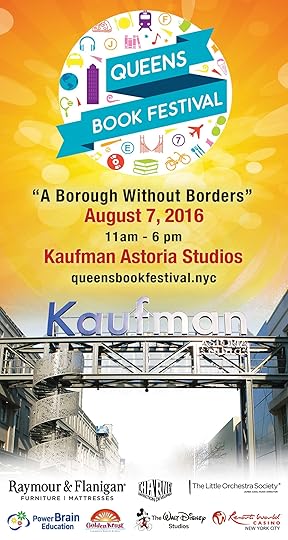Zetta Elliott's Blog, page 35
August 24, 2016
Reparations in Kid Lit
What would reparations look like in the children’s literature community?
August 22, 2016
message in a bottle
 I bought my first TV when I started grad school in 1995 and it still works. I’ve thought about getting a flat screen TV but why waste money when my current model still works? Sure, it can’t support widescreen footage so the captions sometimes get cut off, but that’s a fun word game to play while watching the news! I’m certainly not a Luddite; I do write on a MacBook, but I also vowed years ago that I would never get an iPhone. Too expensive, ethically iffy, and far too fancy for a person like me who rarely uses actively avoids talking on the phone. But then I made my 5-year plan and decided I needed to make my first short film by the end of the year…and Virgin Mobile had a $25/month plan to go with their $200 iPhone 5s, so…I now own an iPhone. And for the past 3 days I’ve been at the Apple store taking advantage of their free workshops. I may go back again tomorrow if I think I’m ready to brush up on editing with iMovie. For now, I’m working on my script and I’m thinking about an important conversation I had yesterday with my radical friends on the west coast. We’re not crazy about social media and the pressure for creatives to “maintain a presence” on platforms like Twitter, but we also recognize the need to get OUR message out into the world. So what’s an introvert to do? I’ve got a few videos that don’t circulate all that much, but they exist and so give other folks a chance to hear my voice. It’s a bit like putting a message in a bottle and tossing it into the sea—my little film won’t compete with flashier productions on trendier topics, but maybe my thoughts on “Black magic” will find that one person who feels stranded, hopeless, or adrift. My BlackademicsTV talk is on the long side at 15 minutes, so I’m aiming for under 3 minutes this time around. Not going to worry about what I’ll look like—this is about VOICE and believing we all have something valuable to say. Will anyone hear me? I figure if people find my books, someone somewhere will find this little film. And maybe they’ll be inspired to make their own film. At the iPhone Basics workshop on Friday, my friend Rosa and I were the youngst people at the table—everyone else was elderly and an immigrant! They’ve embraced smartphone technology so it’s about time I did the same. Look for Film #1 next month!
I bought my first TV when I started grad school in 1995 and it still works. I’ve thought about getting a flat screen TV but why waste money when my current model still works? Sure, it can’t support widescreen footage so the captions sometimes get cut off, but that’s a fun word game to play while watching the news! I’m certainly not a Luddite; I do write on a MacBook, but I also vowed years ago that I would never get an iPhone. Too expensive, ethically iffy, and far too fancy for a person like me who rarely uses actively avoids talking on the phone. But then I made my 5-year plan and decided I needed to make my first short film by the end of the year…and Virgin Mobile had a $25/month plan to go with their $200 iPhone 5s, so…I now own an iPhone. And for the past 3 days I’ve been at the Apple store taking advantage of their free workshops. I may go back again tomorrow if I think I’m ready to brush up on editing with iMovie. For now, I’m working on my script and I’m thinking about an important conversation I had yesterday with my radical friends on the west coast. We’re not crazy about social media and the pressure for creatives to “maintain a presence” on platforms like Twitter, but we also recognize the need to get OUR message out into the world. So what’s an introvert to do? I’ve got a few videos that don’t circulate all that much, but they exist and so give other folks a chance to hear my voice. It’s a bit like putting a message in a bottle and tossing it into the sea—my little film won’t compete with flashier productions on trendier topics, but maybe my thoughts on “Black magic” will find that one person who feels stranded, hopeless, or adrift. My BlackademicsTV talk is on the long side at 15 minutes, so I’m aiming for under 3 minutes this time around. Not going to worry about what I’ll look like—this is about VOICE and believing we all have something valuable to say. Will anyone hear me? I figure if people find my books, someone somewhere will find this little film. And maybe they’ll be inspired to make their own film. At the iPhone Basics workshop on Friday, my friend Rosa and I were the youngst people at the table—everyone else was elderly and an immigrant! They’ve embraced smartphone technology so it’s about time I did the same. Look for Film #1 next month!
August 19, 2016
island dreams
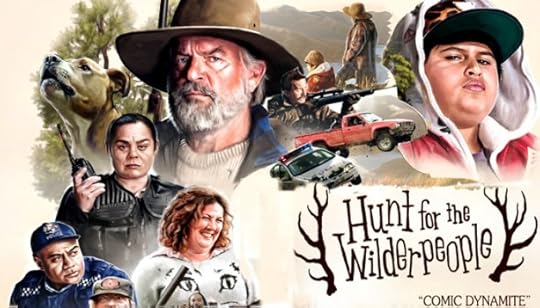 I woke up on Tuesday thinking about Whale Rider. There are two films that absolutely destroy me, and that’s one of them (the other is Billy Elliott). Last week I was in a writing slump so I did some research on folktales for a write-for-hire gig; I’ve always wanted to write about a mermaid, and was happy to come across a Sirena story from Guam. A few days later, I watched a documentary on veterans in Guam and realized I have a lot to learn about the Pacific Islands (Disney’s version of Polynesian culture is on its way). On Wednesday I wrote over a thousand words and decided to treat myself to a matinee; Hunt for the Wilderpeople was playing at the Angelika so I went to see it without knowing much about
I woke up on Tuesday thinking about Whale Rider. There are two films that absolutely destroy me, and that’s one of them (the other is Billy Elliott). Last week I was in a writing slump so I did some research on folktales for a write-for-hire gig; I’ve always wanted to write about a mermaid, and was happy to come across a Sirena story from Guam. A few days later, I watched a documentary on veterans in Guam and realized I have a lot to learn about the Pacific Islands (Disney’s version of Polynesian culture is on its way). On Wednesday I wrote over a thousand words and decided to treat myself to a matinee; Hunt for the Wilderpeople was playing at the Angelika so I went to see it without knowing much about 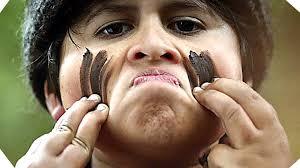 the film (spoilers ahead). It is HILARIOUS but there were some problematic parts for me and I left the theater unsure whether I wanted to watch Lord of the Rings or Whale Rider (I love both, but chose the latter). This month I’ve committed to seeing films that have people of color at the center, and Wilderpeople met that criteria because one of the stars is a Māori boy, Julian Dennison. He brilliantly plays Ricky Baker, a 13-year-old foster child who has been labeled “a bad egg” by Paula, the caseworker responsible for finding him one last placement on a remote farm with Bella and Hec. Paula sees Ricky as a “thug” who is beyond redemption and the boy is clearly inspired by US hip hop culture (he sports a hoodie, tags walls with graffiti, aspires to be a “gangsta,” and at one point he admits the deceased rapper Tupac is his only friend). Bella is loving and welcomes haiku-writing Ricky into their modest home but Hec is a loner who has no use for the boy; when Bella dies suddenly,
the film (spoilers ahead). It is HILARIOUS but there were some problematic parts for me and I left the theater unsure whether I wanted to watch Lord of the Rings or Whale Rider (I love both, but chose the latter). This month I’ve committed to seeing films that have people of color at the center, and Wilderpeople met that criteria because one of the stars is a Māori boy, Julian Dennison. He brilliantly plays Ricky Baker, a 13-year-old foster child who has been labeled “a bad egg” by Paula, the caseworker responsible for finding him one last placement on a remote farm with Bella and Hec. Paula sees Ricky as a “thug” who is beyond redemption and the boy is clearly inspired by US hip hop culture (he sports a hoodie, tags walls with graffiti, aspires to be a “gangsta,” and at one point he admits the deceased rapper Tupac is his only friend). Bella is loving and welcomes haiku-writing Ricky into their modest home but Hec is a loner who has no use for the boy; when Bella dies suddenly, 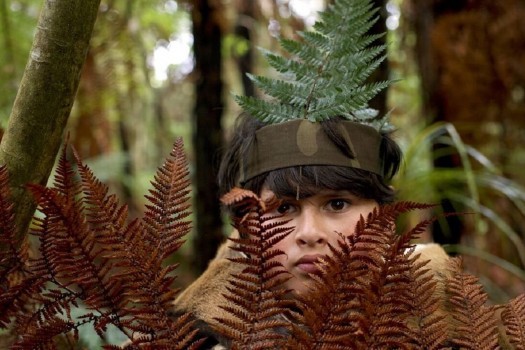 the caseworker returns for Ricky but he sets a fire to fake his own death and flees into the bush with his new pet (a pitbull named Tupac). He quickly gets lost but is found by Hec and the two wind up bonding as fugitives on a five-month run from the police and child welfare services. As you can probably tell from the images I’ve included, the problematic parts of the film for me were the moments when Ricky “played Indian” (see Debbie Reese’s analysis of this same issue in Lane Smith’s latest picture book) The film’s writer/director is Māori and half the actors in the film are as well, but there was no mention of indigenous history, which I found odd. What percentage of kids in foster care in NZ are indigenous, and what is that experience like? Ricky inadvertently and then deliberately accuses Hec of “molestering” him, but in a serious moment he also reveals that a friend from the group home committed suicide after being abused by her foster father. When Ricky and Hec venture into the bush, there’s no mention of the history of land ownership. How did those thousands of hectares become a national park? When Hec admits that he can’t read, Ricky cruelly teases him by performing the role of a “dumb savage” (I’m not sure how to describe it, but that’s how it read to me). By the end of the film, Ricky does end up placed with a Māori family he met while in the bush, which gave me hope (he also invites Hec to live with them). Before she died, Bella told Ricky about a lake that seems to feature in Māori mythology, and that possibly served as his introduction to his cultural heritage. Isolated from his cultural community, Ricky immersed himself in US hip hop culture, which does create some comedic moments in the film (at one point he cocks a hunting rifle and hollers, “Shit just got real!”—a dramatic gesture mimicked by elderly White Hec who doesn’t grasp the cultural significance). But it also makes Black culture look ridiculous and/or only violent, and even though I know that rap music has empowered marginalized youth around the world, it hurts to see young brown men modeling themselves after Black “gangstas.” While watching Whale Rider last night, I noticed that a father recently released from prison leaves the cultural heritage school his son attends to join his tough-guy friends in a car blasting rap music—so rap figures as the antithesis of indigenous cultural awareness rather than the tool to heighten, promote, and preserve one’s history/heritage. I’ve been watching HBO’s The Night Of and EVERY Black character in the show is criminal and/or pathological. In a way, the young Pakistani-American wrongly charged with murder is in Rikers because he wanted to “be cool” and party with the Black male athletes he tutored at college. Now he’s in prison being mentored by the kingpin Black criminal who controls the inmates (all Black) and corrections officers (also all Black). I keep saying I won’t watch another episode but…I’m probably going to see Disney’s Moana, too. We look for the value, right? I should say that I thoroughly enjoyed Hunt for the Wilderpeople and will probably see it again in the theater just so I can discuss it afterward with a friend. And the film IS a comedy, so perhaps it’s unfair and/or unrealistic to “burden” it with these considerations. And clearly I’m viewing it through a US lens. If you’ve seen it, let me know what you think.
the caseworker returns for Ricky but he sets a fire to fake his own death and flees into the bush with his new pet (a pitbull named Tupac). He quickly gets lost but is found by Hec and the two wind up bonding as fugitives on a five-month run from the police and child welfare services. As you can probably tell from the images I’ve included, the problematic parts of the film for me were the moments when Ricky “played Indian” (see Debbie Reese’s analysis of this same issue in Lane Smith’s latest picture book) The film’s writer/director is Māori and half the actors in the film are as well, but there was no mention of indigenous history, which I found odd. What percentage of kids in foster care in NZ are indigenous, and what is that experience like? Ricky inadvertently and then deliberately accuses Hec of “molestering” him, but in a serious moment he also reveals that a friend from the group home committed suicide after being abused by her foster father. When Ricky and Hec venture into the bush, there’s no mention of the history of land ownership. How did those thousands of hectares become a national park? When Hec admits that he can’t read, Ricky cruelly teases him by performing the role of a “dumb savage” (I’m not sure how to describe it, but that’s how it read to me). By the end of the film, Ricky does end up placed with a Māori family he met while in the bush, which gave me hope (he also invites Hec to live with them). Before she died, Bella told Ricky about a lake that seems to feature in Māori mythology, and that possibly served as his introduction to his cultural heritage. Isolated from his cultural community, Ricky immersed himself in US hip hop culture, which does create some comedic moments in the film (at one point he cocks a hunting rifle and hollers, “Shit just got real!”—a dramatic gesture mimicked by elderly White Hec who doesn’t grasp the cultural significance). But it also makes Black culture look ridiculous and/or only violent, and even though I know that rap music has empowered marginalized youth around the world, it hurts to see young brown men modeling themselves after Black “gangstas.” While watching Whale Rider last night, I noticed that a father recently released from prison leaves the cultural heritage school his son attends to join his tough-guy friends in a car blasting rap music—so rap figures as the antithesis of indigenous cultural awareness rather than the tool to heighten, promote, and preserve one’s history/heritage. I’ve been watching HBO’s The Night Of and EVERY Black character in the show is criminal and/or pathological. In a way, the young Pakistani-American wrongly charged with murder is in Rikers because he wanted to “be cool” and party with the Black male athletes he tutored at college. Now he’s in prison being mentored by the kingpin Black criminal who controls the inmates (all Black) and corrections officers (also all Black). I keep saying I won’t watch another episode but…I’m probably going to see Disney’s Moana, too. We look for the value, right? I should say that I thoroughly enjoyed Hunt for the Wilderpeople and will probably see it again in the theater just so I can discuss it afterward with a friend. And the film IS a comedy, so perhaps it’s unfair and/or unrealistic to “burden” it with these considerations. And clearly I’m viewing it through a US lens. If you’ve seen it, let me know what you think.
August 9, 2016
summer slide
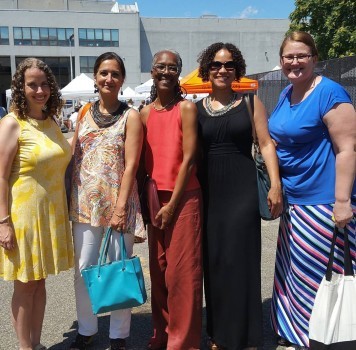 It’s August! Summer is winding down and I’m wrapping up some projects in order to start others. Last week I finished Dragons in a Bag; at 24K words, it’s lower middle grade with illustrations—or will be whether I publish it myself or if my agent finds it a home. The next day I started working on a story for my write-for-hire gig; you’re basically writing on spec, which hasn’t worked out for me in the past, but my boss seems pleased with this story so I’m keeping my fingers crossed. An extra check this summer would make it possible for me to self-publish some books this fall, and right now I’m focusing on The Return and Milo’s Museum. Purple Wong is working on the illustrations for the picture book, and I just got the first sketch from Sara Golish for the cover of the YA novel. So much talent! I feel truly blessed to have the opportunity to work with these amazing artists.
It’s August! Summer is winding down and I’m wrapping up some projects in order to start others. Last week I finished Dragons in a Bag; at 24K words, it’s lower middle grade with illustrations—or will be whether I publish it myself or if my agent finds it a home. The next day I started working on a story for my write-for-hire gig; you’re basically writing on spec, which hasn’t worked out for me in the past, but my boss seems pleased with this story so I’m keeping my fingers crossed. An extra check this summer would make it possible for me to self-publish some books this fall, and right now I’m focusing on The Return and Milo’s Museum. Purple Wong is working on the illustrations for the picture book, and I just got the first sketch from Sara Golish for the cover of the YA novel. So much talent! I feel truly blessed to have the opportunity to work with these amazing artists.
Last Wednesday my BookUp reading club came to an end out in Hollis, Queens. I’ve worked with kids since I was 16, but this job is really the only chance I’ve had to just READ with kids—that’s the focus of the club, and the kids absolutely LOVE to read aloud. We wrapped up with Diary of a Wimpy Kid, and had a really great conversation as we read about whether it’s okay to tease others just because you have been or are being bullied. On Sunday I was in Queens once more for the inaugural book festival. Our panel on the evolution of YA lit was fantastic—I got to meet Sarah Beth Durst, Marina Budhos, Denise Patrick, and Stacy Whitman shared her birthday Butterfinger with me as well as Tu Books’ latest release Perfect Liars by Kimberly Reid. I connected with some aspiring writers, book bloggers, and filmmakers before heading back to Brooklyn. At one point we discussed When We Was Fierce, an offensive YA novel that Candlewick has wisely decided NOT to release this month after online agitation by Black women and their allies. If the book had been released and our concerns had been ignored (as they often are), what are the chances that WWWF would have gone on to win the Newbery Medal? I keep thinking about the saying, “Never cast pearls before swine,” which isn’t about calling anyone a pig. To me it means, “Don’t give something of value to someone who can’t appreciate its worth.” There’s a part of me that resents the fact that my novels don’t often get reviewed, which is why I pressured Booklist to create an inclusive indie review column (mission accomplished). But what’s the point if white reviewers can’t discriminate between racist stereotypes deployed by an outsider and hard truths presented by an insider? At the end of the day, I have no control over that so I’m going to focus on what I can control—my own writing. The goal this month is to finish The Return. It’s been 2 years since I went to Senegal but I picked up some Senegalese food for lunch yesterday and hope that will help put me in the right frame of mind….
Much of this is summed up in my latest newsletter, which you can read here. Time to get back to writing…
August 3, 2016
real fierce
![Pageflex Persona [document: PRS0000040_00016]](https://i.gr-assets.com/images/S/compressed.photo.goodreads.com/hostedimages/1470308438i/19912137.jpg) A few months ago, Ambelin Kwaymullina and I posted a three-part dialogue on this blog. In Part 2 I reflected on the dominance of White women in the kid lit community and the need for reparations. A woman in Seattle recently created a website called Reparations where those invested in social justice can connect—Whites offer resources they’re willing to share and Blacks can request the assistance they need. What if we tried something like that in the kid lit community? How would that play out? These are some of my reflections from this past February:
A few months ago, Ambelin Kwaymullina and I posted a three-part dialogue on this blog. In Part 2 I reflected on the dominance of White women in the kid lit community and the need for reparations. A woman in Seattle recently created a website called Reparations where those invested in social justice can connect—Whites offer resources they’re willing to share and Blacks can request the assistance they need. What if we tried something like that in the kid lit community? How would that play out? These are some of my reflections from this past February:
How could the dominant group ever make amends for the damage done to our children? For decades here in the US they have ignored our pleas for inclusion and perpetrated a form of symbolic annihilation by distorting or altogether erasing the image of Black youth. Can the publishing industry really be trusted to reform itself when those who uphold it haven’t acknowledged the harm they’ve caused? Of course, the first step would be an admission of wrongdoing, but most white Americans prefer reconciliation without its prerequisite: TRUTH.
Last week I came across two White women, Pernille Ripp and Liz Osisek, who blogged about their reassessment of the highly problematic YA novel WHEN WE WAS FIERCE. I was heartened by their honest reflections on their privilege and bias, but know that thousands of copies of WWWF have been pre-ordered and will still wind up in the hands of impressionable young readers across the country. So what can we do? Here’s one option: if you took the time to read, review, order, or recommend that 400-page book—a highly problematic novel written by a cultural outsider that nonetheless earned 3 starred reviews—would you be willing to devote that same time and energy to an urban novel written by a cultural insider? Rich in Color will be hosting a September discussion of my two novels, A WISH AFTER MIDNIGHT and its sequel THE DOOR AT THE CROSSROADS. Neither of my books was reviewed by Kirkus, School Library Journal, Booklist, or Publishers Weekly. And considering the fact that so many White readers fell in love with WWWF, there’s a good chance those review outlets wouldn’t have found my Black teen protagonists as appealing as T, Catch, Yo-Yo, and Ricky-Ricky…
But if you now feel a way about embracing WWWF, here’s an opportunity for you to do the right thing. Give urban fiction by a cultural insider a chance.
July 29, 2016
join us at the Queens Book Festival!
It’s the first of its kind, and it has been carefully planned by women of color—which is why it’s SO inclusive. I’ll be on a panel about diversity in kid lit at 11am. The event is free, but you do need to reserve a seat through Eventbrite. Check the website for more details!
July 26, 2016
Black voices matter
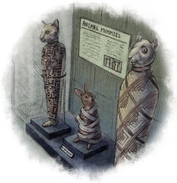 Here we go again. The publishing industry has produced a book written by an outsider that distorts and pathologizes Black youth. Please head over to Crazy QuiltEdi to read reviews of When We Was Fierce by Edith Campbell and Jennifer Baker; then stop by Reading While White to read K.T. Horning’s post, “When Whiteness Dominates Reviews.” Lee & Low’s Diversity Baseline Survey showed us that 90% of reviewers are White women so it shouldn’t come as a surprise that this problematic young adult novel has “earned” three starred reviews from the major outlets. It comes out in a week and only NOW are (some) people listening to the concerns of Black people. I’m so tired of this cycle. No one in the production process thought there might be a problem with this book; one Black author says he likes it and so it goes out for review and is named THE book to read this summer. Meanwhile actual Black writers with actual lived experience within the Black community can’t get their books published. The number of books ABOUT Blacks continues to rise, but not the number of books BY Blacks. When I wrote The Last Bunny in Brooklyn, I included a museum scene where the endangered bunny dreams about being turned into a mummy. Because that is what the dominant group does to us—they appropriate every aspect of our culture until we’re no longer necessary. We become a sort of quaint artifact to be put under glass. There’s the actual annihilation of Black bodies that’s reported on the nightly news, and then there’s the symbolic annihilation where White editors and agents show preference for non-Black writers and their narratives that distort our image/voice. When I spoke to the TYWLS teens last week, I wrapped up with a warning: “If you don’t tell your story, someone else will.” But the truth is, even when you DO tell your story, there’s a good chance that it will be dismissed while an outsider’s story is celebrated for its “authenticity.” If you haven’t read Percival Everett’s satirical novel Erasure, READ IT NOW. It’s about a Black author who only achieves fame when he writes an offensive, absurd mash-up of Native Son and Push (two Black-authored, commercially successful novels criticized for pathologizing Blacks for a White audience). The White literary establishment adores the book, of course, and it goes on to win the most prestigious literary award. That’s satire, but the White appetite for Black pathology is REAL. I haven’t read When We Was Fierce and don’t intend to. If you’re a fan of the author and/or plan to add the book to your school’s library, please take the time to read the reviews listed above. I don’t want the book banned, but I DO want it read and reviewed critically.
Here we go again. The publishing industry has produced a book written by an outsider that distorts and pathologizes Black youth. Please head over to Crazy QuiltEdi to read reviews of When We Was Fierce by Edith Campbell and Jennifer Baker; then stop by Reading While White to read K.T. Horning’s post, “When Whiteness Dominates Reviews.” Lee & Low’s Diversity Baseline Survey showed us that 90% of reviewers are White women so it shouldn’t come as a surprise that this problematic young adult novel has “earned” three starred reviews from the major outlets. It comes out in a week and only NOW are (some) people listening to the concerns of Black people. I’m so tired of this cycle. No one in the production process thought there might be a problem with this book; one Black author says he likes it and so it goes out for review and is named THE book to read this summer. Meanwhile actual Black writers with actual lived experience within the Black community can’t get their books published. The number of books ABOUT Blacks continues to rise, but not the number of books BY Blacks. When I wrote The Last Bunny in Brooklyn, I included a museum scene where the endangered bunny dreams about being turned into a mummy. Because that is what the dominant group does to us—they appropriate every aspect of our culture until we’re no longer necessary. We become a sort of quaint artifact to be put under glass. There’s the actual annihilation of Black bodies that’s reported on the nightly news, and then there’s the symbolic annihilation where White editors and agents show preference for non-Black writers and their narratives that distort our image/voice. When I spoke to the TYWLS teens last week, I wrapped up with a warning: “If you don’t tell your story, someone else will.” But the truth is, even when you DO tell your story, there’s a good chance that it will be dismissed while an outsider’s story is celebrated for its “authenticity.” If you haven’t read Percival Everett’s satirical novel Erasure, READ IT NOW. It’s about a Black author who only achieves fame when he writes an offensive, absurd mash-up of Native Son and Push (two Black-authored, commercially successful novels criticized for pathologizing Blacks for a White audience). The White literary establishment adores the book, of course, and it goes on to win the most prestigious literary award. That’s satire, but the White appetite for Black pathology is REAL. I haven’t read When We Was Fierce and don’t intend to. If you’re a fan of the author and/or plan to add the book to your school’s library, please take the time to read the reviews listed above. I don’t want the book banned, but I DO want it read and reviewed critically.
July 21, 2016
my place
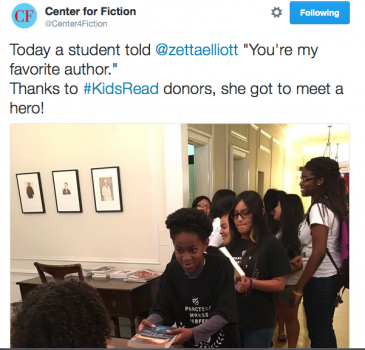 On Monday I had the opportunity to lead a writing workshop with the amazing young women from TWYLS Bronx, Brooklyn, and Harlem at the Center for Fiction in midtown Manhattan. The KidsRead program provided copies of A Wish After Midnight for all the teens, I did my standard book talk, and then we read Sharon Flake’s poem “You Don’t Even Know Me.” After analyzing the poem, I asked the teens to make two lists: how others see you versus how you see yourself. I shared my two lists with them and noted that others often think I “don’t know my place.” I pride myself on being uppity and astonishing those who have low expectations of Black woman. But sometimes I avoid experiences and limit myself because I don’t feel comfortable in a particular place. Last night I was invited to a mixer in lower Manhattan, and I didn’t want to go. I’m not good at mingling, and I don’t generally go out at night, I don’t drink and I don’t do clubs, though I do know you’re expected to dress a certain way. I wanted to stay home and watch NOVA but the invitation came from a dear friend and so I put on some heels (but not a dress), made up a mantra, and chanted it on my way downtown: “This is for Laura. This is for Laura. Think of all the things Laura has done for you.” I got to the rooftop bar and the music was so loud I actually cringed. The place was packed and if Lyn Miller-Lachmann hadn’t been right at the door to greet me with a smile, I seriously would have turned around and gone home. Instead I attached myself to Lyn and she helped me find Laura; we formed a cluster with two other women of color and I managed to act normal (I think) for about half an hour. THEN I went home! And woke up determined to have a day of silence today. I don’t belong in a club or at a bar. This is where I feel most at ease:
On Monday I had the opportunity to lead a writing workshop with the amazing young women from TWYLS Bronx, Brooklyn, and Harlem at the Center for Fiction in midtown Manhattan. The KidsRead program provided copies of A Wish After Midnight for all the teens, I did my standard book talk, and then we read Sharon Flake’s poem “You Don’t Even Know Me.” After analyzing the poem, I asked the teens to make two lists: how others see you versus how you see yourself. I shared my two lists with them and noted that others often think I “don’t know my place.” I pride myself on being uppity and astonishing those who have low expectations of Black woman. But sometimes I avoid experiences and limit myself because I don’t feel comfortable in a particular place. Last night I was invited to a mixer in lower Manhattan, and I didn’t want to go. I’m not good at mingling, and I don’t generally go out at night, I don’t drink and I don’t do clubs, though I do know you’re expected to dress a certain way. I wanted to stay home and watch NOVA but the invitation came from a dear friend and so I put on some heels (but not a dress), made up a mantra, and chanted it on my way downtown: “This is for Laura. This is for Laura. Think of all the things Laura has done for you.” I got to the rooftop bar and the music was so loud I actually cringed. The place was packed and if Lyn Miller-Lachmann hadn’t been right at the door to greet me with a smile, I seriously would have turned around and gone home. Instead I attached myself to Lyn and she helped me find Laura; we formed a cluster with two other women of color and I managed to act normal (I think) for about half an hour. THEN I went home! And woke up determined to have a day of silence today. I don’t belong in a club or at a bar. This is where I feel most at ease:
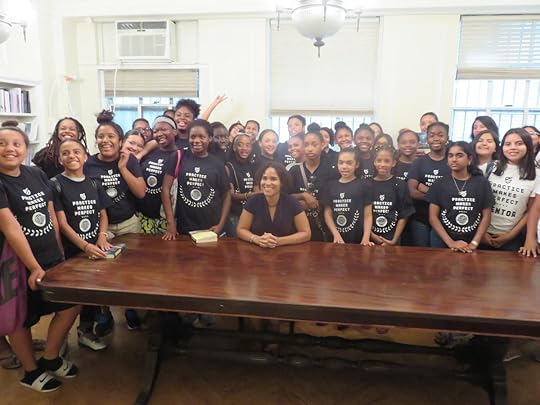 But what kind of role model am I if I don’t embrace discomfort and veer out of my lane sometimes? Just before I left for the mixer I got an email with some good news from my agent. I feel like I’m dipping my toe back into the traditional publishing industry, and I’m not entirely comfortable with that. I say I’m all about hybridity but I don’t want to compromise my values. I want to publish with integrity and the easiest way to do that is to produce my books myself. I want to move beyond books, though, so this weekend I’m going to take an orientation class on film production. How can we amplify the voices of young women of color? What skills do I need to develop in order to make myself a better advocate for young Black readers and writers? I don’t have all the answers but I do feel like I’m moving in the right direction. I heard from a colleague today who developed his own television program; he’d like to collaborate and that would be an excellent opportunity to learn and grow. I went to the bank this morning to make a deposit and came home to find another check in the mail; I was paid by direct deposit for one freelance writing gig that didn’t work out, and then got an email asking me to submit an invoice for my other story, which was accepted by the client. Summer is an anxious time for me—too much unstructured time—but I feel strangely balanced right now. The fall is filling up with speaking gigs, I’m making progress on my unfinished novels. I’m ready to try something new and the planets seem to be aligned in my favor! In time I’ll find my place in the universe…
But what kind of role model am I if I don’t embrace discomfort and veer out of my lane sometimes? Just before I left for the mixer I got an email with some good news from my agent. I feel like I’m dipping my toe back into the traditional publishing industry, and I’m not entirely comfortable with that. I say I’m all about hybridity but I don’t want to compromise my values. I want to publish with integrity and the easiest way to do that is to produce my books myself. I want to move beyond books, though, so this weekend I’m going to take an orientation class on film production. How can we amplify the voices of young women of color? What skills do I need to develop in order to make myself a better advocate for young Black readers and writers? I don’t have all the answers but I do feel like I’m moving in the right direction. I heard from a colleague today who developed his own television program; he’d like to collaborate and that would be an excellent opportunity to learn and grow. I went to the bank this morning to make a deposit and came home to find another check in the mail; I was paid by direct deposit for one freelance writing gig that didn’t work out, and then got an email asking me to submit an invoice for my other story, which was accepted by the client. Summer is an anxious time for me—too much unstructured time—but I feel strangely balanced right now. The fall is filling up with speaking gigs, I’m making progress on my unfinished novels. I’m ready to try something new and the planets seem to be aligned in my favor! In time I’ll find my place in the universe…
July 15, 2016
note to self
 Finishing books is important, but what *really* matters is seeing your book in the hands of young readers. Yesterday I met some impressive young women at Howard University’s Upward Bound program. They were reading A Wish After Midnight and at least one teen was ready for the sequel—she slipped this note to the program coordinator and he shared it with me. Several others made a short film in which they shared their wishes for themselves and their community; you can check it out here. I haven’t written much lately but will try to make a push to finish Dragons in a Bag this weekend. One of the young women at Howard asked me whether I felt satisfied once I finished writing Wish since I wrote it partly in response to the lack of #BlackGirlMagic books in my own childhood. And I told her the truth: there will never be enough books to make up for what I missed when I was her age. Maybe that’s why I never seem to run out of ideas…and why it feels so urgent to finish my own books and get Black girls writing their own stories, too. On Monday I head to the Center for Fiction to work with another group of teenage girls who have read Wish. We’ll have time for a writing workshop and hopefully they’ll have more questions that help me remember why I do what I do.
Finishing books is important, but what *really* matters is seeing your book in the hands of young readers. Yesterday I met some impressive young women at Howard University’s Upward Bound program. They were reading A Wish After Midnight and at least one teen was ready for the sequel—she slipped this note to the program coordinator and he shared it with me. Several others made a short film in which they shared their wishes for themselves and their community; you can check it out here. I haven’t written much lately but will try to make a push to finish Dragons in a Bag this weekend. One of the young women at Howard asked me whether I felt satisfied once I finished writing Wish since I wrote it partly in response to the lack of #BlackGirlMagic books in my own childhood. And I told her the truth: there will never be enough books to make up for what I missed when I was her age. Maybe that’s why I never seem to run out of ideas…and why it feels so urgent to finish my own books and get Black girls writing their own stories, too. On Monday I head to the Center for Fiction to work with another group of teenage girls who have read Wish. We’ll have time for a writing workshop and hopefully they’ll have more questions that help me remember why I do what I do.
July 12, 2016
how to heal
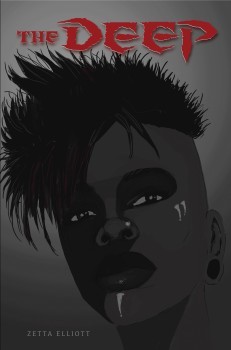 Write. But don’t engage with people who try to tell you how to feel. Write. Make sure you stick to your running regimen and hit the park every other day. Write. Don’t beat yourself up when you fall off the vegan wagon, but know that cake isn’t the answer. Write. Listen to your racing heart and know that your body is trying to tell you something. Write. Turn off the radio or the TV, close the Facebook tab so you don’t absorb all the pain that your friends and loved ones are suffering. Write. Prep for class and be glad that for an hour you can talk to kids about the wonder of books. Write. But cut yourself some slack if you don’t reach your thousand-word quota every day. I’m working on Chapter 8 and know this book only has 10 chapters, so that means I’m nearing the end. When I told my 6th graders in Queens that I was making good progress on my novel, they spontaneously started clapping. We’d only known each other about 15 minutes, but that was their response: “Good for you!” Then we gathered around the biggest table in the room and they assessed the covers of my other 22 books. Which book jumps out at you? Half said Ship of Souls or The Deep. Those books aren’t available through the First Book marketplace, but I’ll see if I can bring a copy of each for their camp library. Kids never fail to impress heal me. I haven’t done a school visit in a while, but the kids today were SO excited about the reading club—especially when we started reading aloud from The Lightning Thief. One page—that’s all we had time to read together—but the looks on their faces, especially the boys…how long will that kind of joy last?
Write. But don’t engage with people who try to tell you how to feel. Write. Make sure you stick to your running regimen and hit the park every other day. Write. Don’t beat yourself up when you fall off the vegan wagon, but know that cake isn’t the answer. Write. Listen to your racing heart and know that your body is trying to tell you something. Write. Turn off the radio or the TV, close the Facebook tab so you don’t absorb all the pain that your friends and loved ones are suffering. Write. Prep for class and be glad that for an hour you can talk to kids about the wonder of books. Write. But cut yourself some slack if you don’t reach your thousand-word quota every day. I’m working on Chapter 8 and know this book only has 10 chapters, so that means I’m nearing the end. When I told my 6th graders in Queens that I was making good progress on my novel, they spontaneously started clapping. We’d only known each other about 15 minutes, but that was their response: “Good for you!” Then we gathered around the biggest table in the room and they assessed the covers of my other 22 books. Which book jumps out at you? Half said Ship of Souls or The Deep. Those books aren’t available through the First Book marketplace, but I’ll see if I can bring a copy of each for their camp library. Kids never fail to impress heal me. I haven’t done a school visit in a while, but the kids today were SO excited about the reading club—especially when we started reading aloud from The Lightning Thief. One page—that’s all we had time to read together—but the looks on their faces, especially the boys…how long will that kind of joy last?
I’m not going to go there, not tonight. I’m going to work on finishing this novel since the kids get to read the first chapter later this week. This 10K-word book will be twice as long as expected, and I’ve already started plotting the sequel. My students in Queens are Black and South Asian and the kids in this novel are Black and South Asian…when I taught for BookUP two summers ago, I started another novel in Queens. Maybe I can get back to that one this fall. A writer friend in Baton Rouge has been out in the street protesting the police murder of Alton Sterling; she finally decided to take a break and in an email called me “a machine.” I know what she meant—I churn words out like there’s a switch somewhere inside that I can just flip at will. There isn’t, of course, but writing is how I survive. I shed a few tears last week but I’m not really a weeper. I’m a writer. My stories are shaped in part by what’s happening in the world around me, and that makes them a form of testimony. I’m not untouched or unchanged by the horror show and neither is my work. But if I can bring joy to the very kids deemed least deserving by this society, then that’s what I will do…

